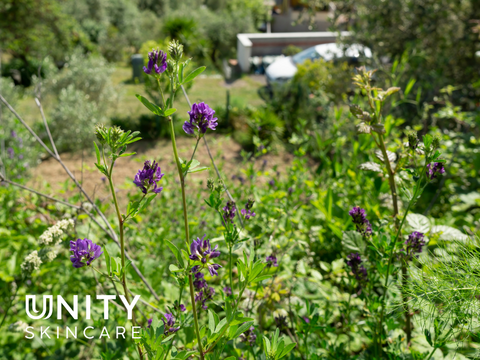Bakuchiol vs Hyaluronic Acid: Which is Right for You?
If you’re a skincare junkie, you’ve probably heard about bakuchiol and hyaluronic acid. Both ingredients have garnered attention for their remarkable skin benefits, but how do they compare?
Let’s dive into the nitty-gritty of bakuchiol and hyaluronic acid, and figure out which one might just be your skin’s new best friend.
What is Bakuchiol?

Bakuchiol (pronounced buh-koo-chee-all) is a natural wonder derived from the seeds of the Psoralea corylifolia plant, a species native to various regions across the globe, including India and Sri Lanka.
This plant has been a staple in traditional Ayurvedic and Chinese medicine for centuries, known for its potent healing and anti-aging properties.
In the realm of modern skincare, bakuchiol stands out as a remarkable alternative to retinol, a widely used ingredient known for its anti-aging benefits.
While retinol can be harsh, leading to irritation and sensitivity, bakuchiol emerges as a gentle savior. It's a boon especially for those with sensitive or reactive skin types, offering a plethora of benefits without the potential drawbacks that come with retinol use.
How Does Bakuchiol Work?

Bakuchiol works its magic by targeting key signs of aging and promoting overall skin health. It stimulates collagen production, a crucial protein that provides structure and elasticity to the skin.
This stimulation helps to reduce the appearance of fine lines and wrinkles, giving the skin a firmer, more youthful appearance.
Moreover, bakuchiol's antioxidant properties shield the skin from oxidative stress caused by environmental aggressors like UV radiation and pollution.
This protection helps prevent premature aging and keeps the skin looking vibrant and healthy.
Benefits of Bakuchiol:
- Kiss goodbye to fine lines and wrinkles
- Shields your skin from free radicals
- A friend for sensitive skin types
- All the anti-aging perks, none of the irritation of retinol
Possible Side Effects of Bakuchiol:
- Generally well-tolerated, but mild irritation may occur
- Possible allergic reactions for those with plant allergies
What is Hyaluronic Acid?

Enter the hydration hero: hyaluronic acid (HA).
This naturally occurring superstar is a glycosaminoglycan, a fancy name for a vital natural substance that's a youth-supporting part of skin.
It's renowned for its unique ability to hold a thousand times its weight in water, ensuring your skin stays as plump and hydrated as a juicy peach.
The Science Behind Hyaluronic Acid
Hyaluronic acid is a humectant, meaning it draws water to the skin and helps prevent moisture loss.
It's naturally found in the body, with a high concentration in the skin, connective tissues, and eyes. In the skin, hyaluronic acid binds to water to help retain moisture, providing hydration and suppleness.
As we age, the natural hyaluronic acid levels in our skin decrease, leading to dryness, fine lines, and wrinkles. Topical hyaluronic acid serums and creams can help replenish this loss, maintaining the skin's moisture barrier and restoring its youthful plumpness.
Benefits of Hyaluronic Acid:
- Quench your skin’s thirst with superior hydration
- Locks in that precious moisture
- Fights the clock with anti-aging effects
- Your skin’s natural ally
Possible Side Effects of Hyaluronic Acid:
- Rare, but may cause mild irritation or redness for some skin types
- Issues mainly arise from injectable hyaluronic acid, not topical forms
Benefits Beyond Hydration
But hyaluronic acid goes beyond just hydration. It also provides antioxidant defense against environmental assault, helping to protect the skin from the damaging effects of free radicals, UV radiation, and pollution.
This dual action – hydrating and defending the skin – makes hyaluronic acid a multifaceted and essential ingredient in skincare routines.
Versatility in Skincare
Hyaluronic acid's versatility is another feather in its cap. It's suitable for all skin types – from oily to dry to sensitive – and it can be used in various forms, including serums, creams, and lotions.
It's also often used in dermatological procedures, such as dermal fillers, to provide immediate hydration and support skin health.
Bakuchiol vs Hyaluronic Acid

Alright, let’s talk bakuchiol versus hyaluronic acid. Imagine you’re standing in a skincare showdown. In one corner, bakuchiol, the gentle warrior, ready to fight the good fight against aging and skin damage without leaving your skin feeling attacked.
In the other corner, hyaluronic acid, the hydration heavyweight, packing a punch of moisture to keep your skin supple and youthful.
So, who wins the bout in the bakuchiol vs hyaluronic acid face-off? Well, it’s not so black and white. If your skin is crying out for hydration, hyaluronic acid is going to be your MVP, ensuring your skin stays moisturized and happy.
But if you’re on the hunt for a gentle anti-aging ally, bakuchiol steps into the spotlight, offering a kinder approach to tackling those pesky signs of aging.
But hey, why choose? Some skincare superheroes on the market blend both bakuchiol and hyaluronic acid, letting you soak up the benefits of both without having to pick sides.
The Bottom Line
Whether you lean towards bakuchiol or hyaluronic acid depends on what your skin is vibing with. Both ingredients offer unique benefits, with bakuchiol providing gentle anti-aging effects and hyaluronic acid offering unparalleled hydration.
When it comes to choosing between bakuchiol and hyaluronic acid, it ultimately boils down to your skincare goals and concerns.
If you prioritize addressing signs of aging, such as fine lines and wrinkles, bakuchiol may be the right choice for you. On the other hand, if hydration is your main focus, hyaluronic acid can provide the much-needed moisture boost your skin craves.
Consider your skin's specific needs and feel free to experiment with products that combine the power of both ingredients for a well-rounded skincare routine.
Ready to let your skin love you back? Good luck!
